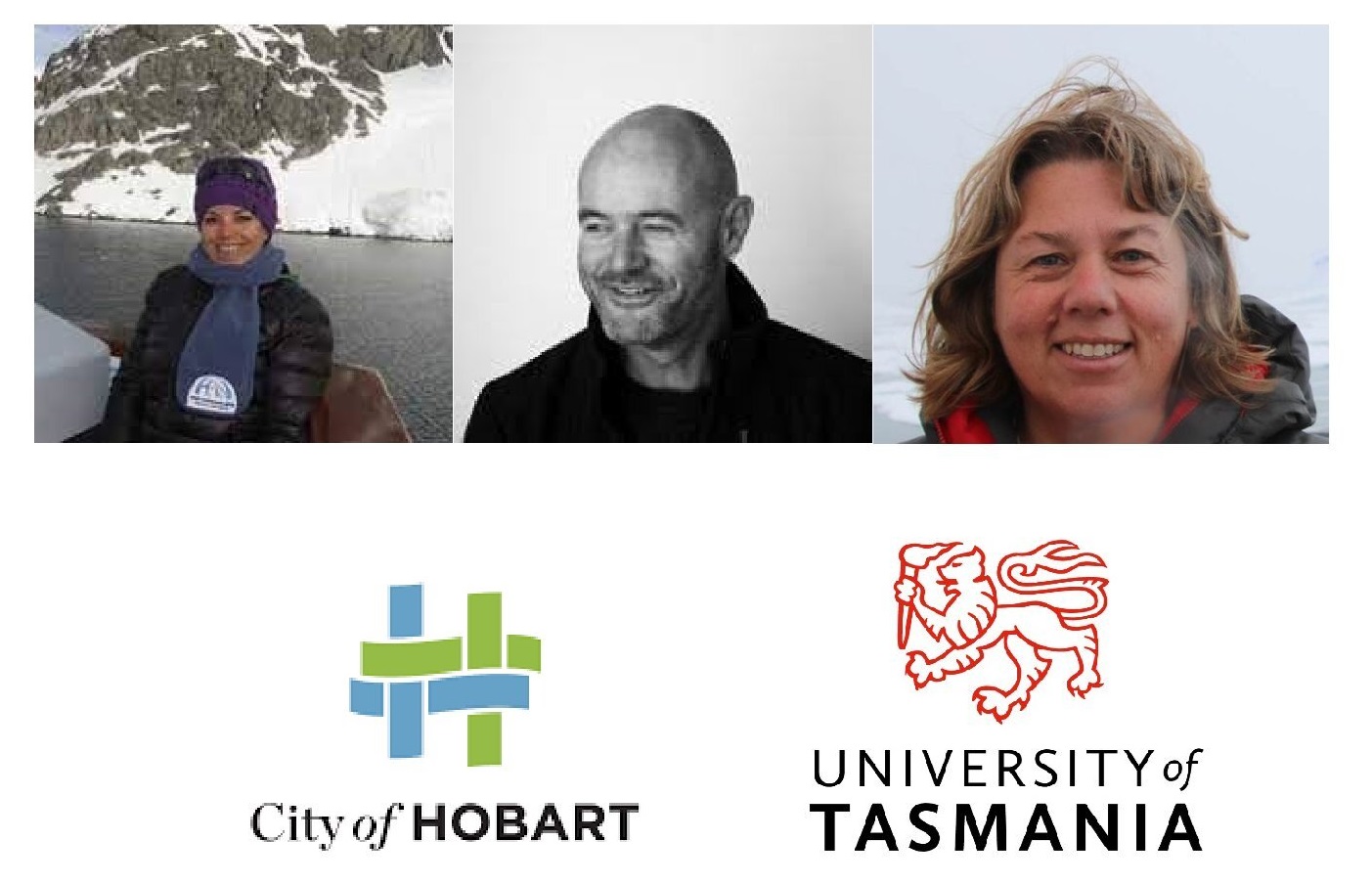ZOOM or IMAS Aurora lecture theatre, Institute for Marine and Antarctic Studies (IMAS) 20 Castray Esplanade Battery Point, TAS 7004
Summary:Antarctica Day - International Panel Discussion
Presenter(s):
- Dr Gabriela Roldan (NZ Antarctic Heritage Trust Education Manager)
- Dr Martin Walch (Australian Antarctic Arts Fellow and Head of Photography, UTAS)
- Dr Cilla Wehi (Director, Te Pūnaha Matatini Centre of Research Excellence in Complex Systems)

More than Just Penguins? Bringing Antarctica alive for people back home
- Date: 1 December 2023
- Time: 6:00-7:00pm (drinks and canapes from 5pm)
- Location: IMAS Aurora Lecture Theatre, University of Tasmania, Castray Esplanade
- ZOOM: Register for online attendance via Zoom: [Click Here]
How do we connect with a place that most of us will never visit? There are many ways to engage people with the Antarctic: through the arts, the media, museums, heritage, education, and citizen science. But while Antarctica may be photogenic, it nonetheless presents unique challenges for people trying to evoke the experience of being there.
Join this international panel to discuss the diverse successes, obstacles and opportunities related to connecting with Antarctica from back home.
There IS more to the place than penguins!
Panel:
- Dr Gabriela Roldan (NZ Antarctic Heritage Trust Education Manager)
- Dr Martin Walch (Australian Antarctic Arts Fellow and Head of Photography, UTAS)
- Dr Cilla Wehi (Director, Te Pūnaha Matatini Centre of Research Excellence in Complex Systems)
Chair:
- Deputy Lord Mayor Councillor Helen Burnet
Hosted by Professor Elizabeth Leane (Professor of Antarctic Studies in the School of Humanities, College of Arts, Law and Education) and Dr Hanne Nielsen (Senior Lecturer in Antarctic Law and Governance at the Institute for Marine and Antarctic Studies) as part of the University of Tasmania’s Antarctic and Southern Ocean mission.
The event is co-sponsored by the City of Hobart as part of Antarctica Day celebrations.
Speakers' Bios:
Dr Gabriela Roldan
Gabriela Roldan is a the Education Manager at the NZ Antarctic Heritage Trust and a postdoctoral researcher at the University of Canterbury (NZ). Gabriela’s work focuses on the Antarctic Gateway cities of: Cape Town (South Africa), Christchurch (New Zealand), Hobart (Australia), Punta Arenas (Chile) and Ushuaia (Argentina) and the connections that these cities construct in regard to Antarctica. Her research project aims to determine if so-called ‘Gateway’ connections result in a unique “Antarctic identity” that might transcend national boundaries.
Gabriela grew up in Ushuaia (Argentina) and living so close to Antarctica sparked the curiosity and passion that have taken her to Antarctica more than 40 times. She has been involved in a range of roles, from training winter base staff to assisting policy makers on Antarctic tourism matters. Gabriela continues working as a naturalist guide for Antarctic cruise ships, as well as creating educational programmes for children and developing teaching resources in NZ.
Dr Martin Walch
Martin Walch is a Tasmanian artist who lives and works in Hobart, where he coordinates the Photography program at the School of Creative Arts and Media, University of Tasmania. Walch works across a range of media including photography, video, sound, computer programming and data visualisation.
Walch has been exhibited in national and international venues including Photographica Australis Asia Tour; Naarden Photo Festival Nederlands; ARCO Madrid; the 2002 Adelaide Biennial of Australian Art; the Embassy of Australia, Washington DC, USA; and the Museum of Contemporary Art, Taipei.
Awards and bursaries include: joint-winner Siglo magazine’s National Collaborations Prize for Writers and Photographers 1997; New Media Fund Development Grant, Australia Council for the Arts 1999; Arts Tasmania artist grants 1997 and 2000; Artist-in-Residence with Copper Mines of Tasmania at Mount Lyell, Western Tasmania 1998-2003; member of the Visual Arts/Craft Board of the Australia Council for the Arts, 2002 – 2005; Winner of Hobart City Art Prize 2008; Australian Research Council Discovery Project The Derwent Project 2014-2016; the Australian Antarctic Arts Fellowship 2017/18 and Australian Research Council Discovery Project Creative Antarctica 2022-2025.
Walch is represented in public and private collections including the Tasmanian Museum and Art Gallery, the Australian Centre for the Moving Image, the Art Gallery of South Australia, Parliament House Art Collection, Canberra, The National Portrait Gallery of Australia, and the Nevada Museum’s Centre for Art and Environment.
Dr Cilla Wehi (Director, Te Pūnaha Matatini Centre of Research Excellence in Complex Systems)
Priscilla is a conservation biologist whose research has two main research themes: first, ecological knowledge; evolutionary ecology, and especially foraging behaviour, including isotope and nutrient analyses of diet; and secondly, socioecological relationships, including cultural environmental management.
She frequently works on human-nature relationships, including biocultural diversity and past, present and future Indigenous environmental relationships. She also works on introduced species that challenge native ecosystems, insect ecology and behaviour, in particular the sexually dimorphic New Zealand tree wētā genus Hemideina spp.
She explores the relationship between conservation biology and mātauranga from her lived experience in extended whānau communities of Waikato, Ngāpuhi nui tonu and Tūhoe while also drawing from her roots as a New Zealand woman with Scottish clan origins. Current work includes building an inter-disciplinary team to explore Māori philosophical frameworks in relation to Antarctica in her role as Leader of the Vision Mātauranga programme in research exploring the effectiveness of the Ross Sea Marine Protected Area.
Priscilla supports cultural change and builds inclusivity in science to create broad platforms for intellectual advancement. In 2020 she received an Inspirational Alumna Award from the School of biological Sciences, University of Canterbury.

Contact: Antarctica.Day@utas.edu.au